人教版九年级下册 Unit14 中考复习 课件(共37张PPT)
文档属性
| 名称 | 人教版九年级下册 Unit14 中考复习 课件(共37张PPT) | 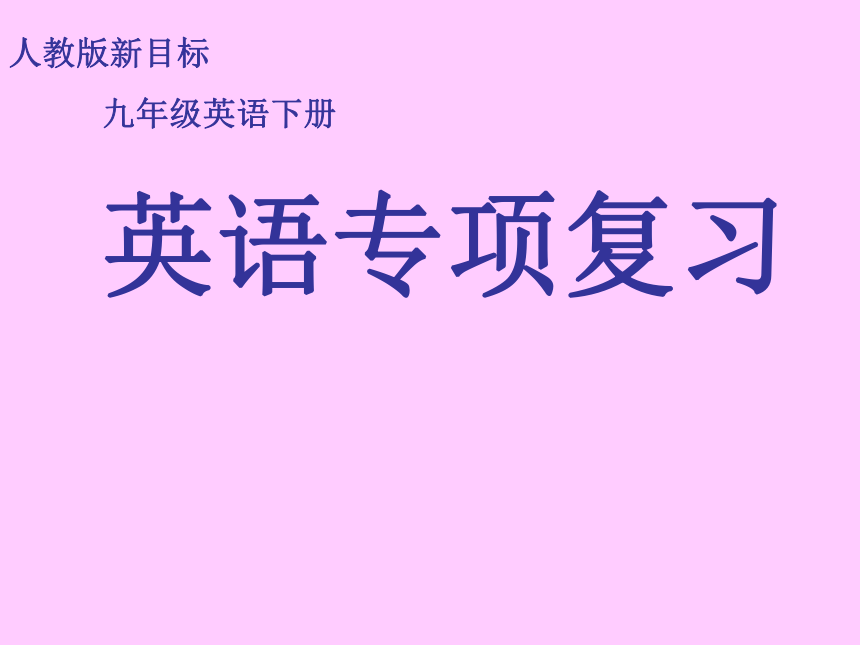 | |
| 格式 | ppt | ||
| 文件大小 | 675.0KB | ||
| 资源类型 | 教案 | ||
| 版本资源 | 人教新目标(Go for it)版 | ||
| 科目 | 英语 | ||
| 更新时间 | 2023-03-17 21:41:40 | ||
图片预览

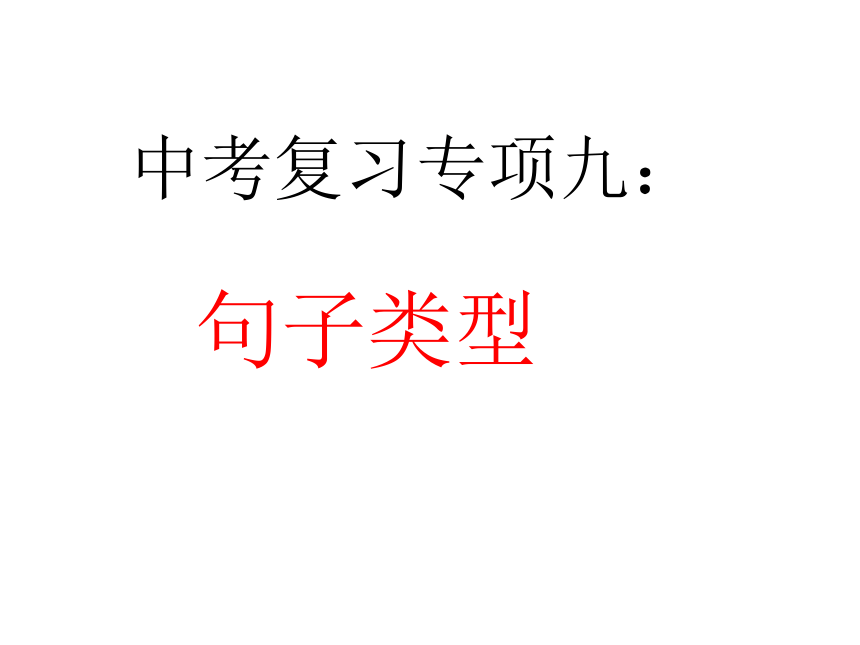
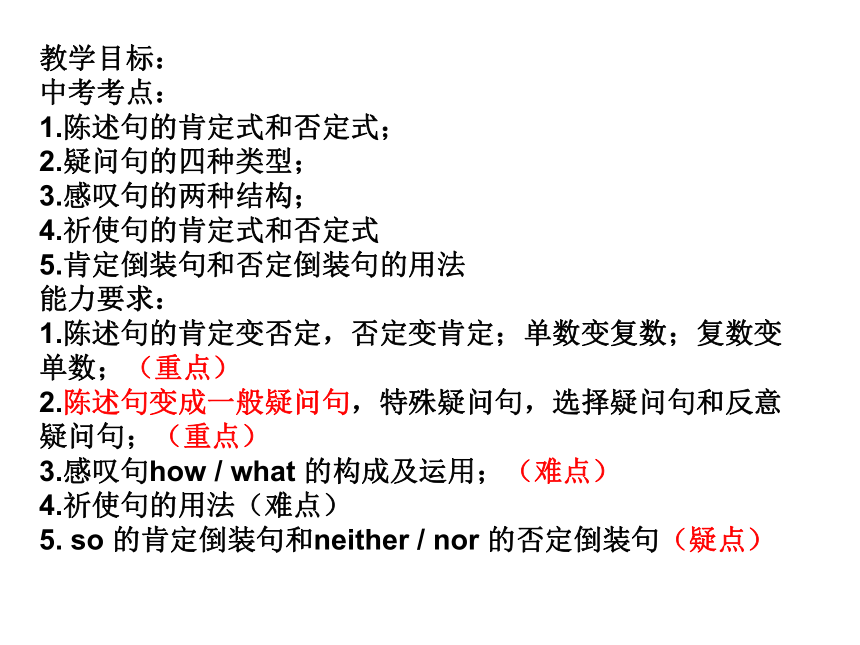
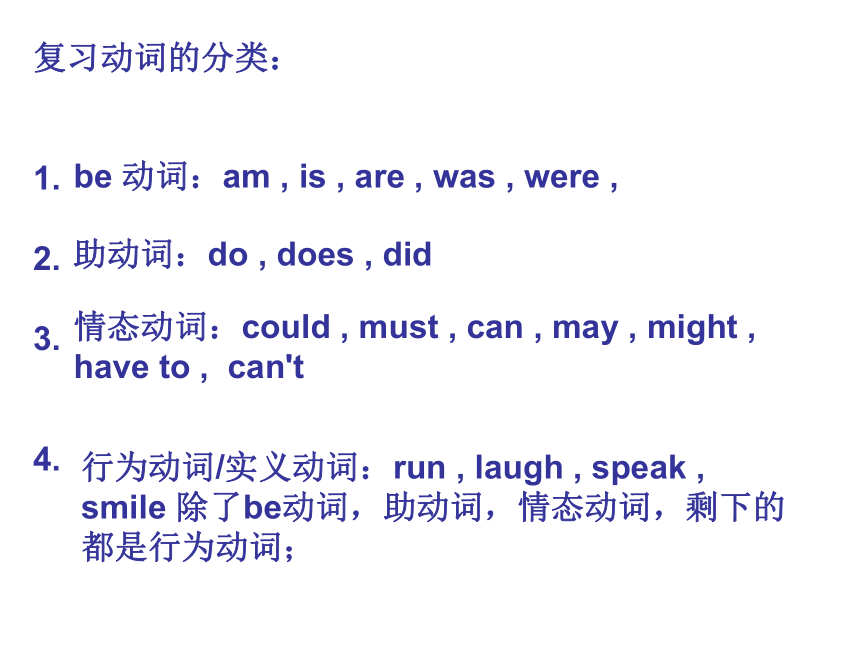
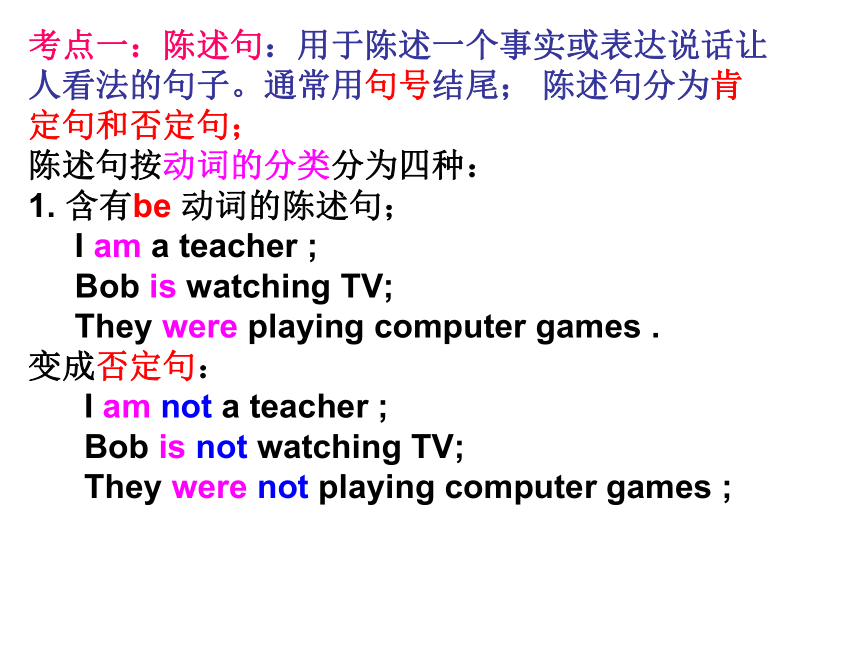
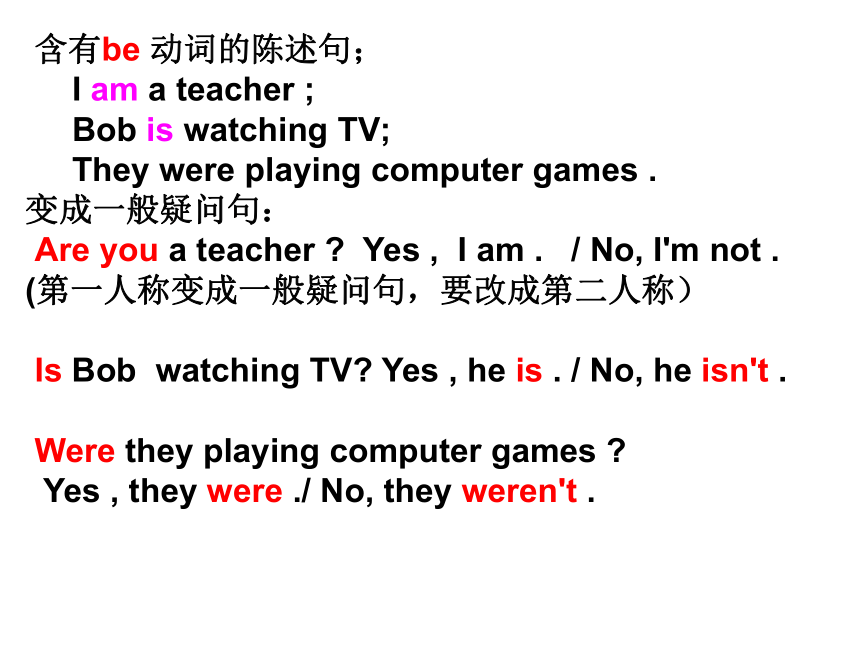
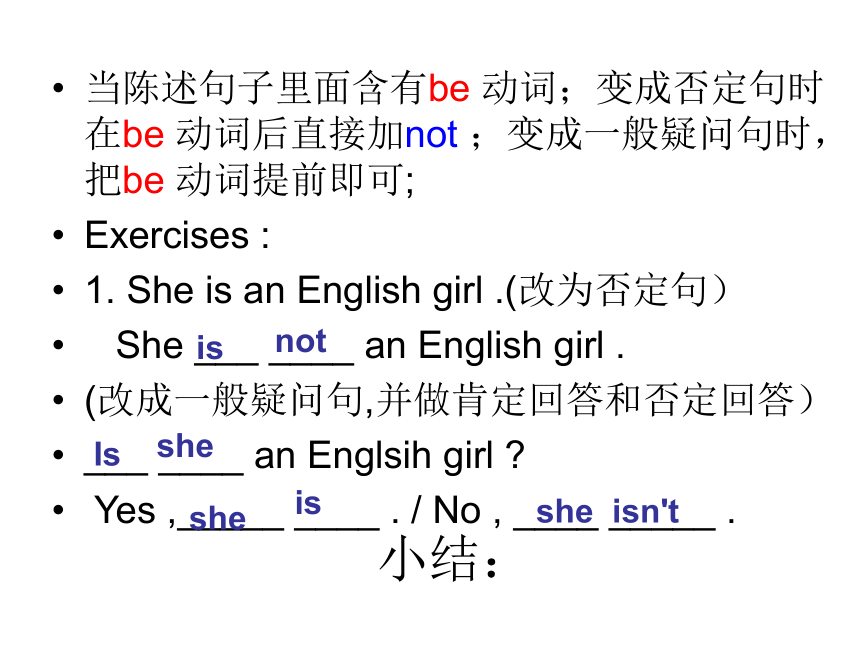
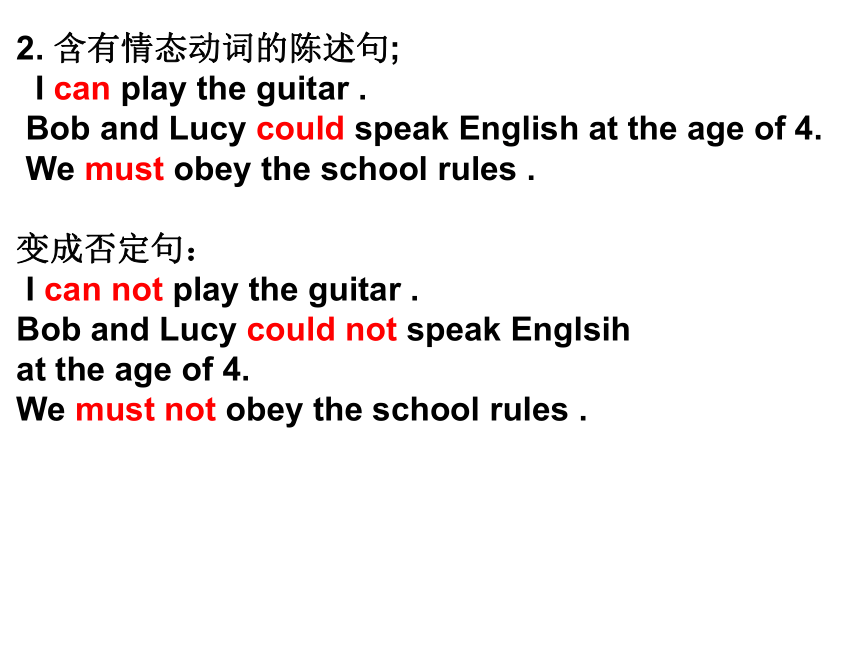
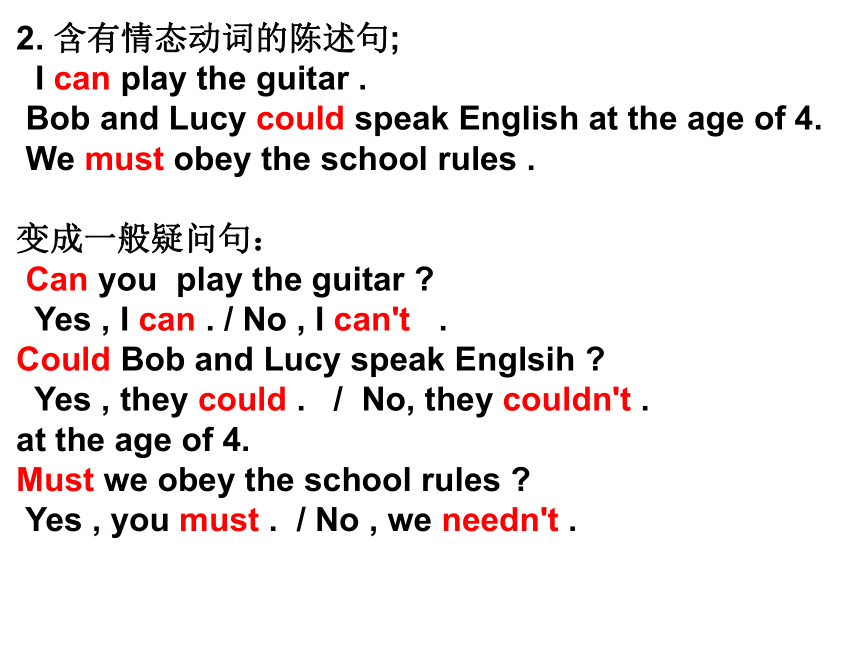
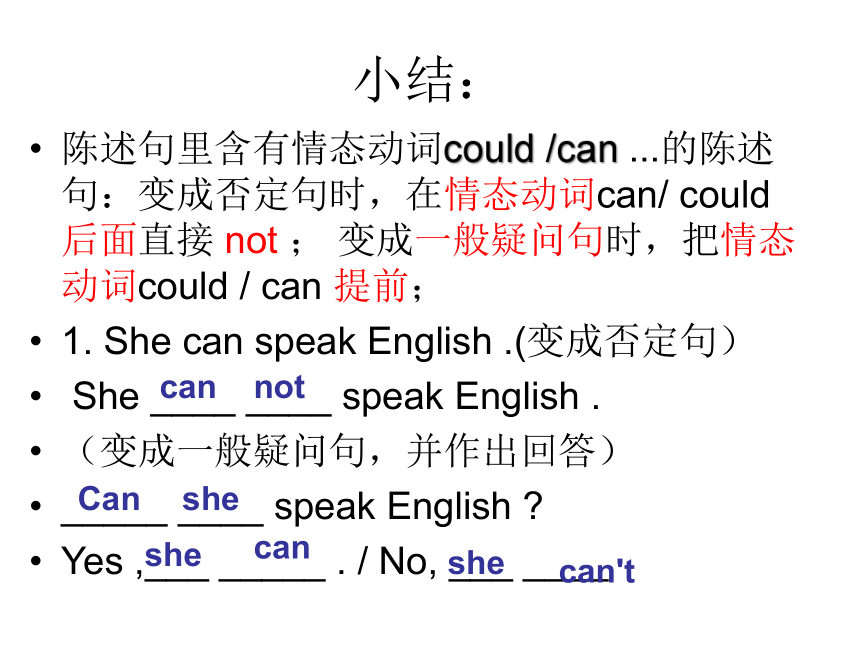
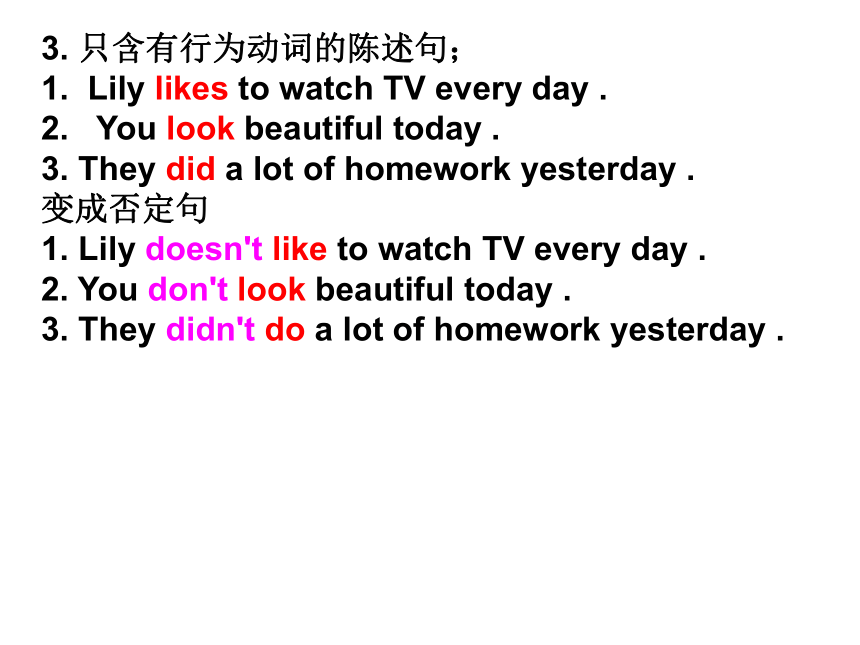
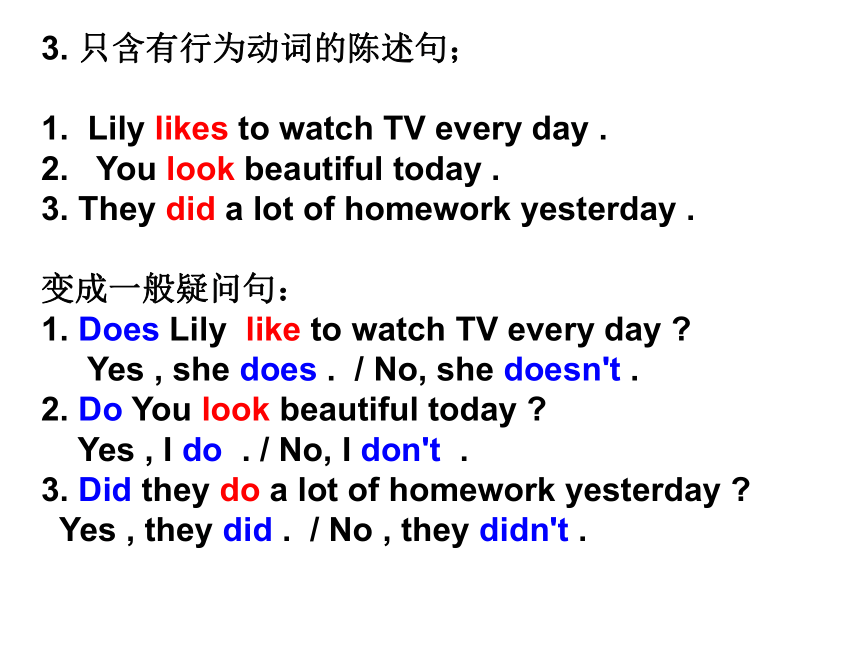
文档简介
(共37张PPT)
英语专项复习
人教版新目标
九年级英语下册
中考复习专项九:
句子类型
教学目标:
中考考点:
1.陈述句的肯定式和否定式;
2.疑问句的四种类型;
3.感叹句的两种结构;
4.祈使句的肯定式和否定式
5.肯定倒装句和否定倒装句的用法
能力要求:
1.陈述句的肯定变否定,否定变肯定;单数变复数;复数变单数;(重点)
2.陈述句变成一般疑问句,特殊疑问句,选择疑问句和反意疑问句;(重点)
3.感叹句how / what 的构成及运用;(难点)
4.祈使句的用法(难点)
5. so 的肯定倒装句和neither / nor 的否定倒装句(疑点)
复习动词的分类:
1.
2.
3.
4.
be 动词:am , is , are , was , were ,
助动词:do , does , did
情态动词:could , must , can , may , might , have to , can't
行为动词/实义动词:run , laugh , speak , smile 除了be动词,助动词,情态动词,剩下的都是行为动词;
考点一:陈述句:用于陈述一个事实或表达说话让人看法的句子。通常用句号结尾; 陈述句分为肯定句和否定句;
陈述句按动词的分类分为四种:
1. 含有be 动词的陈述句;
I am a teacher ;
Bob is watching TV;
They were playing computer games .
变成否定句:
I am not a teacher ;
Bob is not watching TV;
They were not playing computer games ;
含有be 动词的陈述句;
I am a teacher ;
Bob is watching TV;
They were playing computer games .
变成一般疑问句:
Are you a teacher Yes , I am . / No, I'm not .
(第一人称变成一般疑问句,要改成第二人称)
Is Bob watching TV Yes , he is . / No, he isn't .
Were they playing computer games
Yes , they were ./ No, they weren't .
小结:
当陈述句子里面含有be 动词;变成否定句时在be 动词后直接加not ;变成一般疑问句时, 把be 动词提前即可;
Exercises :
1. She is an English girl .(改为否定句)
She ___ ____ an English girl .
(改成一般疑问句,并做肯定回答和否定回答)
___ ____ an Englsih girl
Yes ,_____ ____ . / No , ____ _____ .
is
not
Is
she
she
is
she
isn't
2. 含有情态动词的陈述句;
I can play the guitar .
Bob and Lucy could speak English at the age of 4.
We must obey the school rules .
变成否定句:
I can not play the guitar .
Bob and Lucy could not speak Englsih
at the age of 4.
We must not obey the school rules .
2. 含有情态动词的陈述句;
I can play the guitar .
Bob and Lucy could speak English at the age of 4.
We must obey the school rules .
变成一般疑问句:
Can you play the guitar
Yes , I can . / No , I can't .
Could Bob and Lucy speak Englsih
Yes , they could . / No, they couldn't .
at the age of 4.
Must we obey the school rules
Yes , you must . / No , we needn't .
小结:
陈述句里含有情态动词could /can ...的陈述句:变成否定句时,在情态动词can/ could 后面直接 not ; 变成一般疑问句时,把情态动词could / can 提前;
1. She can speak English .(变成否定句)
She ____ ____ speak English .
(变成一般疑问句,并作出回答)
_____ ____ speak English
Yes ,___ _____ . / No, ___ ____
can
not
Can
she
she
can
she
can't
3. 只含有行为动词的陈述句;
1. Lily likes to watch TV every day .
2. You look beautiful today .
3. They did a lot of homework yesterday .
变成否定句
1. Lily doesn't like to watch TV every day .
2. You don't look beautiful today .
3. They didn't do a lot of homework yesterday .
3. 只含有行为动词的陈述句;
1. Lily likes to watch TV every day .
2. You look beautiful today .
3. They did a lot of homework yesterday .
变成一般疑问句:
1. Does Lily like to watch TV every day
Yes , she does . / No, she doesn't .
2. Do You look beautiful today
Yes , I do . / No, I don't .
3. Did they do a lot of homework yesterday
Yes , they did . / No , they didn't .
小结:
当陈述句中的谓语动词只有行为动词充当时,变成否定句需要在行为动词前加上don't , doesn't , didn't ,同时要把行为动词还原成原形即可;
变成一般疑问句需要Do , Does , Did 来帮忙, 助动词放在句首,同时要把行为动词还原成原形即可。
eg . Lily likes apples .(改成否定句)
Lily ______ _____ apples .
(改成一般疑问句)
____ Lily ____ apples
Yes , ____ ____ ./ No, ____ _____ .
doesn't
like
Does
like
she
does
she
doesn't
4. 现在完成时的句子即:含有have /has + done ...
的陈述句:
I have learned English since 2012.
She has kept the books for two weeks .
They have been to Thailand twice .
变成否定句:
I have not learned Englsih since 2012.
She has not kept the books for two weeks .
They have not been to Thailand twice .
4. 现在完成时的句子即:含有have /has + done ...
的陈述句:
I have learned English since 2012.
She has kept the books for two weeks .
They have been to Thailand twice .
变成一般疑问句:
Have you learned Englsih since 2012
Yes , I have . / No, I haven't .
Has she kept the books for two weeks
Yes , she has . / No, she hasn't .
Have they been to Thailand twice
Yes , they have . / No, they haven't .
小结:
在现在完成时的句型中即:
主语+have / has +p.p +...的陈述句;变成否定句时,在have/ has后加not ;
变成一般疑问句时,把Have / Has 提前即可。
Exercises :
She has kept the books for two weeks .(改为否定句)
She ____ ____ kept the books for two weeks .
(改为一般疑问句)
___ she ____ the books for two weeks
Yes , she ___ . / No , she ___ .
has
not
Has
kept
has
hasn't
考点二:疑问句:
1.一般疑问句
2.特殊疑问句
3.选择疑问句
4.反意疑问句
1. 一般疑问句:用yes 或no 回答的疑问句;
结构:
1. Be+ 主语+...?
2. Does / Do / Did助动词 +主语+...?
3. Could / Can/ Must / May ...情态动词+ 主语+...?
4. Have/ Has + 主语+ p.p +...
eg. 将下列句子改成一般疑问句,并回答。
1. I am a student .
_____ ______ a student
Yes , ___ _____ . / No, _____ ____ .
2. Lily watches TV every day .
_____ Lily _______ TV every day
Yes , ______ _____ . / No, _____ _____.
Are
you
I
am
I'm
not
Does
watch
she
does
she
doesn't
eg. 将下列句子改成一般疑问句,并回答。
3. Lily can speak English .
____ Lily _____ English
Yes , she ____ . / No, she ______.
4. You have learned English for three years .
______ you ______ English for three years
Yes , ____ ____ . / No, _____ ______.
Can
speak
can
can't
Have
learned
I
have
I
haven't
2. 特殊疑问句=特殊疑问词+一般疑问句?
What language does she speak
特殊疑问句:常见的疑问句有:who(谁) , whom(谁) , whose (谁的), what(什么) , when (什么时候),
what time (几点),where(哪里) , how(怎样) , how old(多大) , how much(多少钱) , how many(多少) , which(哪个) , why(为什么) , how long(多长时间) , how soon(多久) , how often ,(多久一次)
Exercise :
1. She teaches English since 2012.(划线提问)
_____ ______ ______ she ______ English
How
long
does
teach
3. 选择疑问句= 一般疑问句+or +被选择的对象?不能用yes 和no 回答。
Is she tall or short
Can she play the drums or the piano
4. 反意疑问句:陈述句,简单问句?
用yes 和no 回答; 事实是肯定的用yes , 事实是否定的用no .
遵循的原则是: 前肯定, 后否定;
前否定,后肯定;
She is a nurse ,____ _____
They can fly a kite ,___ _____
Lucy watches TV,______ _______
They have learned English ,______ _____
She isn't a nurse ,______ ______
They can not fly a kite ,______ _______
They haven't learned English ,____ ______
There is little water in the bottle ,_____ ____
Let's ..., _____ _____
Let us ... , ______ ______
Don't speak ,______ _______
isn't
she
can't they
doesn't she
haven't they
is she
can they
have they
is there
shall we
will you
will you
I have few friends here,
I have a few frends here,
She has little money in her bag,
She has a little money in her bag,
Danny can hardly speak Chinese,
6.Danny can speak some Chinese,
do I
does she
can he
don’t I
doesn’tshe
can’t he
考点三:祈使句:表示命令,请求或建议某人做某事的句型;
结构:
肯定式: V原形+ ...
Stand , please .
Open the door .
否定式: Don't + V原形+...
Don't smoke .
Don't talk .
练习题:
Stand up , please .(改为否定句)
____ _____ up , please .
Don't stand
考点四:感叹句:以感叹号结尾的句子即...
结构分两种:
1. What + a/an + 形容词+ 名词+主语+谓语!
2. How + 形容词/副词+主语+谓语!
eg . What a beautiful girl she is !
How beautiful the girl is !
练习题:
( ) 1. ___ fine weather it is today !
A. What B. What a C. How D. How a
A
考点五:倒装句
肯定倒装句结构:
So +be动词/ 助动词/情态动词/ have / has + 主语.
(某人也一样,后面的人和前面的人不是同一个人)
否定倒装句结构:
Neither / (Nor )+be 动词/助动词/情态动词/ have / has +主语.
eg . -Lucy is a beautiful .(Lucy是一个漂亮的女孩)
- So is Lily .(Lily 也是)
---John can't speak English .(John 不会说英语)
---Neither can Helen .(Helen 也不会)
So +主语+be动词/助动词/情态动词/have / has .
(某人确实如此)
一般现在时的被动语态:主语+am / is / are + p.p+...
1. The students clean the classroom every day .(改成被动语态)
The classroom _____ _______ by the students every day .
2. Most of Germans speak German .(改成被动语态)
German ____ ______ by Germans .(改成被动语态)
3. The postman brings letters and postcards to people's homes .(改成被动语态)
Letters and postcards _______ ______ to people's homes by the postman .
is
cleaned
is
spoken
are
brought
一般过去时的被动语态:主语+was / were +p.p+...
eg. 1.They sold the fridge at a low price .(改为被动语态)
The fridge ______ _____ at a low price (by them ).
2.Different writers translated the book into different languages .(改为被动语态)
The book _____ ______ into different languages by different writers .
3. Our parents advised us not to go out alone .(改为被动语态)
We _____ ______ not to go out alone by our parents .
was
sold
was
translated
were
advised
含有情态动词的被动语态:
主语+情态动词+be +p.p+...
eg. 1. Paretns should allow the teenager to choose their own clothes .
The teenagers should _______ _______to choose their own clothes .
2. You must clean your classroom every day .
Your bedroom must ____ ______ every day .
3. Parents should give teenages chances to make their own decisions .
Teenages should _____ ______ chances to make their own decisions .
be
allowed
be
cleaned
be
given
小结:将主动语态变成被动语态的基本方法:
1.将主动语态的宾语作为被动语态的主语;
2.谓语动词变成be +及物动词的过去分词, 并通过be 的变化来表达出不同的时态。
3.主动语态的主语变成by 短语, 组成介词短语,有时可省略。
We saw an alien get out of the UFO .
An alien ____ _____ ____ get out of the UFO .
If you see the cartoon film , you will____ laugh .
a , be made B. be made to C. make to D. make
was
seen
to
B
句型转换:
1.Sandra enjoys her stay in the city .(改为否定句)
Sandra _____ _____ her stay in the city .
2.She will have her singing lessons next Monday .(划线提问)
______ _______ she have her singing lessons
3.They get a letter from their son twice a week .(划线提问)
____ ______ do they get a letter from their son
4.The woman in white is a nurse .(同上)
_____ ______ is a nurse
doesn't
enjoy
When
will
How
often
Which
woman
1.It rained heavily yesterday morning .(变成一般疑问句)
____ it _______ heavily yesterday morning
2.The girl is my cousin . The girl is wearing glasses .(合并成一句话)
The girl ____ ____ wearing glasses is my cousin.
3. The boy is too young to go to school .(同义句)
The boy is ____ young ____ he can't go to school .
The boy isn't ______ ______ to go to school .
Did
rain
who
is
so
that
old
enough
4. The teacher asked me , “Will you be a volunteer ”(变成宾语从句)
The teacher asked me ____ I ______ be a volunteer .
5. I will go to Canada to visit my uncle in three days .(划线提问)
____ _____ will you go to Canada to visit your uncle
6.Mr. Smith is a very kind man .
______ _____ kind man Mr. Smith is !
if
would
How
soon
What
a
1.The mooncakes are delicious .(改为感叹句)
_____ ______ the mooncakes are !
_____ ____ mooncakes they are !
2. My grandma cleans the room every day .(改成被动语态)
The room ____ _____ by my grandma every day .
3.Mary didn't use to sleep late ,______ ____
How
delicious
What
delicious
is
cleaned
did
she
4. We must plant trees every year .(改成被动语态)
The trees must _____ ______ every year .
5. The boss makes the workers work 12 hours every day .
The workers ______ made _____ work 12 hours every day .
be
planted
are
to
考点六:其它
单数变复数:
人称代词有单复数;指示代词有单复数;
动词有单复数; 名词有单复数;
She is a girl . (变成复数)
_____ ____ ____ .
They
are
girls
This is my pen .
____ ______ my ______.
These
are
pens
英语专项复习
人教版新目标
九年级英语下册
中考复习专项九:
句子类型
教学目标:
中考考点:
1.陈述句的肯定式和否定式;
2.疑问句的四种类型;
3.感叹句的两种结构;
4.祈使句的肯定式和否定式
5.肯定倒装句和否定倒装句的用法
能力要求:
1.陈述句的肯定变否定,否定变肯定;单数变复数;复数变单数;(重点)
2.陈述句变成一般疑问句,特殊疑问句,选择疑问句和反意疑问句;(重点)
3.感叹句how / what 的构成及运用;(难点)
4.祈使句的用法(难点)
5. so 的肯定倒装句和neither / nor 的否定倒装句(疑点)
复习动词的分类:
1.
2.
3.
4.
be 动词:am , is , are , was , were ,
助动词:do , does , did
情态动词:could , must , can , may , might , have to , can't
行为动词/实义动词:run , laugh , speak , smile 除了be动词,助动词,情态动词,剩下的都是行为动词;
考点一:陈述句:用于陈述一个事实或表达说话让人看法的句子。通常用句号结尾; 陈述句分为肯定句和否定句;
陈述句按动词的分类分为四种:
1. 含有be 动词的陈述句;
I am a teacher ;
Bob is watching TV;
They were playing computer games .
变成否定句:
I am not a teacher ;
Bob is not watching TV;
They were not playing computer games ;
含有be 动词的陈述句;
I am a teacher ;
Bob is watching TV;
They were playing computer games .
变成一般疑问句:
Are you a teacher Yes , I am . / No, I'm not .
(第一人称变成一般疑问句,要改成第二人称)
Is Bob watching TV Yes , he is . / No, he isn't .
Were they playing computer games
Yes , they were ./ No, they weren't .
小结:
当陈述句子里面含有be 动词;变成否定句时在be 动词后直接加not ;变成一般疑问句时, 把be 动词提前即可;
Exercises :
1. She is an English girl .(改为否定句)
She ___ ____ an English girl .
(改成一般疑问句,并做肯定回答和否定回答)
___ ____ an Englsih girl
Yes ,_____ ____ . / No , ____ _____ .
is
not
Is
she
she
is
she
isn't
2. 含有情态动词的陈述句;
I can play the guitar .
Bob and Lucy could speak English at the age of 4.
We must obey the school rules .
变成否定句:
I can not play the guitar .
Bob and Lucy could not speak Englsih
at the age of 4.
We must not obey the school rules .
2. 含有情态动词的陈述句;
I can play the guitar .
Bob and Lucy could speak English at the age of 4.
We must obey the school rules .
变成一般疑问句:
Can you play the guitar
Yes , I can . / No , I can't .
Could Bob and Lucy speak Englsih
Yes , they could . / No, they couldn't .
at the age of 4.
Must we obey the school rules
Yes , you must . / No , we needn't .
小结:
陈述句里含有情态动词could /can ...的陈述句:变成否定句时,在情态动词can/ could 后面直接 not ; 变成一般疑问句时,把情态动词could / can 提前;
1. She can speak English .(变成否定句)
She ____ ____ speak English .
(变成一般疑问句,并作出回答)
_____ ____ speak English
Yes ,___ _____ . / No, ___ ____
can
not
Can
she
she
can
she
can't
3. 只含有行为动词的陈述句;
1. Lily likes to watch TV every day .
2. You look beautiful today .
3. They did a lot of homework yesterday .
变成否定句
1. Lily doesn't like to watch TV every day .
2. You don't look beautiful today .
3. They didn't do a lot of homework yesterday .
3. 只含有行为动词的陈述句;
1. Lily likes to watch TV every day .
2. You look beautiful today .
3. They did a lot of homework yesterday .
变成一般疑问句:
1. Does Lily like to watch TV every day
Yes , she does . / No, she doesn't .
2. Do You look beautiful today
Yes , I do . / No, I don't .
3. Did they do a lot of homework yesterday
Yes , they did . / No , they didn't .
小结:
当陈述句中的谓语动词只有行为动词充当时,变成否定句需要在行为动词前加上don't , doesn't , didn't ,同时要把行为动词还原成原形即可;
变成一般疑问句需要Do , Does , Did 来帮忙, 助动词放在句首,同时要把行为动词还原成原形即可。
eg . Lily likes apples .(改成否定句)
Lily ______ _____ apples .
(改成一般疑问句)
____ Lily ____ apples
Yes , ____ ____ ./ No, ____ _____ .
doesn't
like
Does
like
she
does
she
doesn't
4. 现在完成时的句子即:含有have /has + done ...
的陈述句:
I have learned English since 2012.
She has kept the books for two weeks .
They have been to Thailand twice .
变成否定句:
I have not learned Englsih since 2012.
She has not kept the books for two weeks .
They have not been to Thailand twice .
4. 现在完成时的句子即:含有have /has + done ...
的陈述句:
I have learned English since 2012.
She has kept the books for two weeks .
They have been to Thailand twice .
变成一般疑问句:
Have you learned Englsih since 2012
Yes , I have . / No, I haven't .
Has she kept the books for two weeks
Yes , she has . / No, she hasn't .
Have they been to Thailand twice
Yes , they have . / No, they haven't .
小结:
在现在完成时的句型中即:
主语+have / has +p.p +...的陈述句;变成否定句时,在have/ has后加not ;
变成一般疑问句时,把Have / Has 提前即可。
Exercises :
She has kept the books for two weeks .(改为否定句)
She ____ ____ kept the books for two weeks .
(改为一般疑问句)
___ she ____ the books for two weeks
Yes , she ___ . / No , she ___ .
has
not
Has
kept
has
hasn't
考点二:疑问句:
1.一般疑问句
2.特殊疑问句
3.选择疑问句
4.反意疑问句
1. 一般疑问句:用yes 或no 回答的疑问句;
结构:
1. Be+ 主语+...?
2. Does / Do / Did助动词 +主语+...?
3. Could / Can/ Must / May ...情态动词+ 主语+...?
4. Have/ Has + 主语+ p.p +...
eg. 将下列句子改成一般疑问句,并回答。
1. I am a student .
_____ ______ a student
Yes , ___ _____ . / No, _____ ____ .
2. Lily watches TV every day .
_____ Lily _______ TV every day
Yes , ______ _____ . / No, _____ _____.
Are
you
I
am
I'm
not
Does
watch
she
does
she
doesn't
eg. 将下列句子改成一般疑问句,并回答。
3. Lily can speak English .
____ Lily _____ English
Yes , she ____ . / No, she ______.
4. You have learned English for three years .
______ you ______ English for three years
Yes , ____ ____ . / No, _____ ______.
Can
speak
can
can't
Have
learned
I
have
I
haven't
2. 特殊疑问句=特殊疑问词+一般疑问句?
What language does she speak
特殊疑问句:常见的疑问句有:who(谁) , whom(谁) , whose (谁的), what(什么) , when (什么时候),
what time (几点),where(哪里) , how(怎样) , how old(多大) , how much(多少钱) , how many(多少) , which(哪个) , why(为什么) , how long(多长时间) , how soon(多久) , how often ,(多久一次)
Exercise :
1. She teaches English since 2012.(划线提问)
_____ ______ ______ she ______ English
How
long
does
teach
3. 选择疑问句= 一般疑问句+or +被选择的对象?不能用yes 和no 回答。
Is she tall or short
Can she play the drums or the piano
4. 反意疑问句:陈述句,简单问句?
用yes 和no 回答; 事实是肯定的用yes , 事实是否定的用no .
遵循的原则是: 前肯定, 后否定;
前否定,后肯定;
She is a nurse ,____ _____
They can fly a kite ,___ _____
Lucy watches TV,______ _______
They have learned English ,______ _____
She isn't a nurse ,______ ______
They can not fly a kite ,______ _______
They haven't learned English ,____ ______
There is little water in the bottle ,_____ ____
Let's ..., _____ _____
Let us ... , ______ ______
Don't speak ,______ _______
isn't
she
can't they
doesn't she
haven't they
is she
can they
have they
is there
shall we
will you
will you
I have few friends here,
I have a few frends here,
She has little money in her bag,
She has a little money in her bag,
Danny can hardly speak Chinese,
6.Danny can speak some Chinese,
do I
does she
can he
don’t I
doesn’tshe
can’t he
考点三:祈使句:表示命令,请求或建议某人做某事的句型;
结构:
肯定式: V原形+ ...
Stand , please .
Open the door .
否定式: Don't + V原形+...
Don't smoke .
Don't talk .
练习题:
Stand up , please .(改为否定句)
____ _____ up , please .
Don't stand
考点四:感叹句:以感叹号结尾的句子即...
结构分两种:
1. What + a/an + 形容词+ 名词+主语+谓语!
2. How + 形容词/副词+主语+谓语!
eg . What a beautiful girl she is !
How beautiful the girl is !
练习题:
( ) 1. ___ fine weather it is today !
A. What B. What a C. How D. How a
A
考点五:倒装句
肯定倒装句结构:
So +be动词/ 助动词/情态动词/ have / has + 主语.
(某人也一样,后面的人和前面的人不是同一个人)
否定倒装句结构:
Neither / (Nor )+be 动词/助动词/情态动词/ have / has +主语.
eg . -Lucy is a beautiful .(Lucy是一个漂亮的女孩)
- So is Lily .(Lily 也是)
---John can't speak English .(John 不会说英语)
---Neither can Helen .(Helen 也不会)
So +主语+be动词/助动词/情态动词/have / has .
(某人确实如此)
一般现在时的被动语态:主语+am / is / are + p.p+...
1. The students clean the classroom every day .(改成被动语态)
The classroom _____ _______ by the students every day .
2. Most of Germans speak German .(改成被动语态)
German ____ ______ by Germans .(改成被动语态)
3. The postman brings letters and postcards to people's homes .(改成被动语态)
Letters and postcards _______ ______ to people's homes by the postman .
is
cleaned
is
spoken
are
brought
一般过去时的被动语态:主语+was / were +p.p+...
eg. 1.They sold the fridge at a low price .(改为被动语态)
The fridge ______ _____ at a low price (by them ).
2.Different writers translated the book into different languages .(改为被动语态)
The book _____ ______ into different languages by different writers .
3. Our parents advised us not to go out alone .(改为被动语态)
We _____ ______ not to go out alone by our parents .
was
sold
was
translated
were
advised
含有情态动词的被动语态:
主语+情态动词+be +p.p+...
eg. 1. Paretns should allow the teenager to choose their own clothes .
The teenagers should _______ _______to choose their own clothes .
2. You must clean your classroom every day .
Your bedroom must ____ ______ every day .
3. Parents should give teenages chances to make their own decisions .
Teenages should _____ ______ chances to make their own decisions .
be
allowed
be
cleaned
be
given
小结:将主动语态变成被动语态的基本方法:
1.将主动语态的宾语作为被动语态的主语;
2.谓语动词变成be +及物动词的过去分词, 并通过be 的变化来表达出不同的时态。
3.主动语态的主语变成by 短语, 组成介词短语,有时可省略。
We saw an alien get out of the UFO .
An alien ____ _____ ____ get out of the UFO .
If you see the cartoon film , you will____ laugh .
a , be made B. be made to C. make to D. make
was
seen
to
B
句型转换:
1.Sandra enjoys her stay in the city .(改为否定句)
Sandra _____ _____ her stay in the city .
2.She will have her singing lessons next Monday .(划线提问)
______ _______ she have her singing lessons
3.They get a letter from their son twice a week .(划线提问)
____ ______ do they get a letter from their son
4.The woman in white is a nurse .(同上)
_____ ______ is a nurse
doesn't
enjoy
When
will
How
often
Which
woman
1.It rained heavily yesterday morning .(变成一般疑问句)
____ it _______ heavily yesterday morning
2.The girl is my cousin . The girl is wearing glasses .(合并成一句话)
The girl ____ ____ wearing glasses is my cousin.
3. The boy is too young to go to school .(同义句)
The boy is ____ young ____ he can't go to school .
The boy isn't ______ ______ to go to school .
Did
rain
who
is
so
that
old
enough
4. The teacher asked me , “Will you be a volunteer ”(变成宾语从句)
The teacher asked me ____ I ______ be a volunteer .
5. I will go to Canada to visit my uncle in three days .(划线提问)
____ _____ will you go to Canada to visit your uncle
6.Mr. Smith is a very kind man .
______ _____ kind man Mr. Smith is !
if
would
How
soon
What
a
1.The mooncakes are delicious .(改为感叹句)
_____ ______ the mooncakes are !
_____ ____ mooncakes they are !
2. My grandma cleans the room every day .(改成被动语态)
The room ____ _____ by my grandma every day .
3.Mary didn't use to sleep late ,______ ____
How
delicious
What
delicious
is
cleaned
did
she
4. We must plant trees every year .(改成被动语态)
The trees must _____ ______ every year .
5. The boss makes the workers work 12 hours every day .
The workers ______ made _____ work 12 hours every day .
be
planted
are
to
考点六:其它
单数变复数:
人称代词有单复数;指示代词有单复数;
动词有单复数; 名词有单复数;
She is a girl . (变成复数)
_____ ____ ____ .
They
are
girls
This is my pen .
____ ______ my ______.
These
are
pens
同课章节目录
- Unit 1 How can we become good learners.
- Section A
- Section B
- Unit 2 I think that mooncakes are delicious!
- Section A
- Section B
- Unit 3 Could you please tell me where the restroom
- Section A
- Section B
- Unit 4 I used to be afraid of the dark.
- Section A
- Section B
- Unit 5 What are the shirts made of?
- Section A
- Section B
- Review of Units 1-5
- Unit 6 When was it invented?
- Section A
- Section B
- Unit 7 Teenagers should be allowed to choose their
- Section A
- Section B
- Unit 8 It must belong to Carla.
- Section A
- Section B
- Unit 9 I like music that I can dance to.
- Section A
- Section B
- Unit 10 You're supposed to shake hands.
- Section A
- Section B
- Review of Units 6-10
- Unit 11 Sad movies make me cry.
- Section A
- Section B
- Unit 12 Life is full of the unexpected
- Section A
- Section B
- Unit 13 We're trying to save the earth!
- Section A
- Section B
- Unit 14 I remember meeting all of you in Grade 7.
- Section A
- Section B
- Review of Units 11-14
